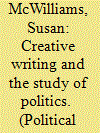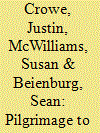| Srl | Item |
| 1 |
ID:
155742


|
|
|
|
|
| Summary/Abstract |
Creative writing is not part of professional training in political science. Scholars in other fields, though, testify to the benefits of creative writing assignments, and my experiences teaching an undergraduate course on Politics and Literature suggest that there may be value in adding creative writing into certain political science courses. As with other forms of non-academic writing that political scientists identify as enriching, creative writing allows students to consider politics from multiple perspectives and expands their communicative powers. Working at the craft of storytelling—as opposed to abstract argumentation—can help students to think through key claims in contemporary political thought. Moreover, in this age of “alternative facts,” doing creative writing in a politics course may help students hone a critical skill of citizenship: thinking about the news in terms of narrative. In this essay, I consider the advantages and challenges of bringing creative writing into the study of politics.
|
|
|
|
|
|
|
|
|
|
|
|
|
|
|
|
| 2 |
ID:
096397


|
|
|
|
|
| Publication |
2010.
|
| Summary/Abstract |
As part of a course considering "American Democracy in Theory and Practice," we took 36 students to Rick Warren's Saddleback Church in Lake Forest, California. During that visit, students observed a community that seeks self-sufficiency and yet proves to be simultaneously responsive to and reflective of American democracy more broadly. Specifically, in a few short hours, they were able to see the virtues of civic association, the difficulty of respecting individualism in large-scale polities, the influence of regional identity, and the two-way interaction between politics and culture-all themes that featured prominently in our course. We offer this reflection to suggest the pedagogical benefits of showing the tensions of American politics in action and to encourage colleagues to consider integrating similar ventures into their own courses.
|
|
|
|
|
|
|
|
|
|
|
|
|
|
|
|